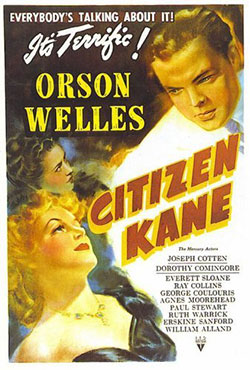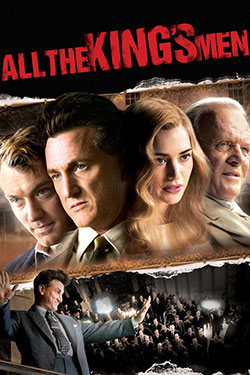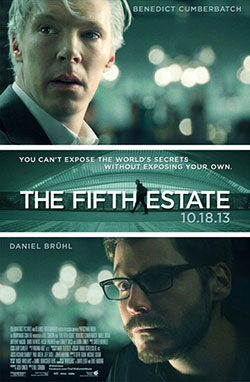In this month’s column, Frank Beaver expands on themes he put forth last month in “Hollywood Reporter.”
Citizen Kane
Orson Welles’ Citizen Kane (1941) is a brilliant film with journalism at its core. While its Fourth Estate organization is a newspaper—The Inquirer—and its anti-heroic protagonist a bold publisher, the film has almost nothing to do with the types of newsroom/reporter stories that were the focus of last month’s look at how American movies have covered the news media.
Those films, from His Girl Friday to Spotlight, approached their subjects from a generally positive perspective. Journalism is seen as a professional, honorable undertaking. By contrast, Citizen Kane is pessimistic and dark, weighed down by a thought-provoking account of how authoritarian control of a news operation can undermine the virtuous goals of truth and honesty deemed essential in journalistic practice.
That said, why is Citizen Kane often cited in critics’ polls as cinema’s greatest film, ever?
Fake news
First, Welles ingeniously frames his mosaic biography of media magnate Charles Foster Kane by way of investigative reporting. Using a clever plotting conceit known as a MacGuffin, a reporter named Thompson (William Alland) is seeking clues to understand the significance of Kane’s mysterious deathbed word: “Rosebud.” Thompson interviews Kane’s close associates—those “who loved him,” and those “who hated his guts.”
Thus begins the complex, labyrinthine form of Citizen Kane, an enigmatic process that demands viewer complicity in sorting through the film’s characterizations and thematics. As the film unfolds, the reporter’s research reveals Kane as a narcissistic man of self-assured power and contradiction. Running The Inquirer—purchased with a childhood fortune that came to him at age 25—an undaunted Kane sets about the noble goal of creating a paper “for the people.”
A Declaration of Principles for “truthful” reporting of the news, however, is, in truth, hollow and hypocritical. False news and “yellow journalism” prevail at The Inquirer. Professional disagreements are met with scorn when Kane’s unethical news tactics are called into question. Little or no regard is held for writers and reporters.
Personally, Kane is depicted as classy, appealing, charming. He’s shown to be a talented song-and-dance man with a gift for amusement by elevating his ears up and down in coordinated cadence. But in the end, happiness eludes Kane. He is dragged down by the Wall Street crash and two failed marriages.
In interviews with Kane’s ex-wife, the heavy-drinking Susan Alexander (Dorothy Comingore), and former friend Jedediah Leland (Joseph Cotten) Thompson begins to understand what made Kane tick: the unrealized quest for love. As Leland puts it: “All he wanted out of life was love. That’s Charlie’s story—the story of how he lost it. You see, he just didn’t have any to give. He loved Charlie Kane, of course, very dearly.” In a bitter complaint to Kane in their lonely, cavernous “pleasure palace,” Xanadu, Susan Alexander shouts: “You don’t love me. You don’t love anybody. You just want to be loved. That’s all you want: I’m Charles Foster Kane!”
The reporter conducts a final interview with Kane’s butler, Raymond (Paul Stewart), at which point Thompson realizes he will never uncover Rosebud’s meaning. As he departs Xanadu, he tells Raymond that a single word can’t explain a man’s life and, resigned, surmises that Rosebud was probably just a missing piece in a jigsaw puzzle.
Rosebud…
That missing piece becomes evident to the viewer, however. In the film’s final shot we see the snow sled that 8-year old Charlie Kane had played with outside his parents’ boarding house being tossed in a blazing furnace in Xanadu’s basement. Through the flames we see its branded Rosebud lettering melting away.
It was on that wintry Colorado day that young Kane was unceremoniously taken East by an appointed guardian, to be groomed for his “rightful,” optimal place in a new world where unlimited wealth would surely pave the way. The Rosebud metaphor is clear: It represents the “lost childhood” for which Kane still longs at his death, even as a novelty-store snow globe crashes to the floor with the protagonist’s final utterance.
http://youtu.be/zyv19bg0scg
More to the story
On its release Citizen Kane scored poorly at the box office. Many filmgoers left the cinema baffled by its rambling plot structure. My long-time colleague in the Communication Department Professor Edgar Willis told me that when he and wife, Zella, saw the film in 1941 they thought maybe the reels had been mis-ordered by the projectionist. Thus was the “new” experience of Welles’ artistry.
Citizen Kane’s undeniably brilliant cinematic components resulted in nine Oscar nominations. But the film received only one award from the Academy of Motion Picture Arts and Sciences—Best Writing (Original Screenplay) to Orson Welles and Herman J. Mankiewicz. Best Picture went to John Ford’s How Green was My Valley.
A nexus of factors probably contributed to Hollywood’s reception of the Welles masterpiece. The brash and outspoken 25-year old auteur, despite his prodigious theater and broadcast background, had done little to endear himself to the film community.And there were the battles with media magnate William Randolph Hearst, an alleged prototype for Welles’ Kane character. Warned in advance by gossip columnist Hedda Hopper and other entertainment reporters that Welles had co-opted elements of his life and career, Hearst launched legal threats against RKO where the film was shot, and denied advertising in his massive newspaper and media chain—the country’s largest. Hearst was particularly incensed that Citizen Kane’s Susan Alexander character had possibly been inspired by his mistress and protege, the actress Marion Davies.
The antipathy against the film was finally put aside in 2012 when the Hearst family agreed to a screening of Citizen Kane at the Hearst Castle Visitor Center in San Simeon, Calif., as part of the San Luis Obispo International Film Festival. What would Orson Welles, who had raised the ire of William Randolph Hearst, and who would never be fully embraced by Hollywood, have made of that?
All the King’s Men
In his introduction to a broadcast of All the King’s Men (1949) on Turner Classic Movies (TCM) film critic Paul Tatara proclaimed: “This is one of the finest political films in the history of American cinema and it still packs a punch. Pick through any current newspaper or internet sites and you’re bound to find political situations that echo All the King’s Men.” (Feb. 18, 2014).
Too close to home…
Robert Penn Warren’s 1946 Pulitzer-Prize winning novel about a Depression-era politician inspired Robert Rossen’s film adaptation of the same name. The picture follows Willie Stark (Broderick Crawford), who ascends from a country “hick” candidate to governor of Louisiana. Warren’s fictional inspiration for Willie Stark came from Louisiana governor (1928-32) and U.S. Senator (1932-35) Huey Long.
Brilliant doctoral student Jack Burden (John Ireland) narrates the action as he abandons his dissertation to work as a reporter at The Chronicle, a down-state Louisiana newspaper.
The newspaper’s editor sends Burden to cover outsider candidate Willie Stark and his bid for election to a treasurer seat in a “one-street” town. Thus begins the conjoining of a power-hungry politician and a newspaper man who’s drawn in by a campaign with populist appeal. In his ongoing coverage for The Chronicle Burden begins to refer in his articles to Stark as “an honest man with courage.” In one article Burden writes: “As I watched him shake that big fist and listened to his words boom across that field, I had the feeling that Willie Stark would neither be steered away or scared away from his purpose.”
Although Stark loses his first election, a citizens group convinces him to run for governor and fight against state graft and corruption. As he promises tax reform and financial revenue for infrastructure improvements, voter support swells and campaign rallies turn increasingly boisterous. To spur Stark on, Burden offers instructions on how to improve his appeals to voters: “Just tell ’em you’re going to soak the fat boys . . . Make ’em mad . . . Stir ’em up and they’ll love it and come back for more. But for heaven’s sake don’t try and improve their minds.”
Politics as usual
In one of his campaign rally speeches Stark avers: “I have nothing to hide—I’ll make a deal with the devil if it will help me carry out my program. But believe me, there are no strings attached to those deals. Do you know what good comes out of? Out of bad. That’s what good comes out of. Because you can’t make it out of anything else.”
When The Chronicle editor tells Burden the paper won’t print any more stories about Stark’s campaign events, which often bring opposing factions to violence, Burden quits the paper and moves fully into Stark’s camp. Swept into office, Stark rams bill after bill through, urgently striving to make good on campaign promises and, hypocritically, even entering into secretive deals with people he’d once railed against. Eventually Stark is exposed for favoritism and corruption, leading to impeachment proceedings.
Ultimately, Jack Burden, earlier praised by campaign aide Sadie Burke (Mercedes McCambridge) for his intelligence, must research and produce damaging evidence on Stark’s opponents. That task leads to a collusive act with destructive consequences, one which makes Burden an incontrovertible player in Stark’s ruthless and self-centered pursuit of power—no more noble a portrait of a news man than that of Charles Foster Kane. The film remains to this day a powerful, relevant screen experience.
All the King’s Men received 1949’s Best Picture Oscar with Broderick Crawford winning Best Actor and Mercedes McCambridge winning Best Supporting Actress.
A remake in 2006 featured Sean Penn as Willie Stark and Jude Law as Jack Burden. Critics dismissed the retread as overwrought and disappointing.
(Note: The original screenplay of Rossen’s 1949 film is available online. Google: Screenplays for You—All the King’s Men.)
The Fifth Estate
Bill Condon’s The Fifth Estate (2013) moves the news-focused film story into the digital age with a factional screenplay about WikiLeaks founder Julian Assange (Benedict Cumberbatch). The other central character is online information activist Daniel Domscheit-Berg (Daniel Bruhl) who worked for WikiLeaks as a spokesman before falling out with Assange. Domscheit-Berg wrote the screenplay based on his 2011 book Inside WikiLeaks: My Time With Julian Assange at the World’s Most Dangerous Website.
Transparency in the digital age
At first Assange and Domscheit-Berg are aligned in their efforts to create a website devoted to releasing information being withheld from the public while retaining anonymity for its sources. But when U.S. Army Intelligence analyst Bradley Manning (now Chelsea Manning) delivers a massive trove of classified government documents to WikiLeaks, the partnership disintegrates over how to best handle the information.
Redaction issues dominate the story as Assange and company prepare to release the sensitive documents to the mainstream media. But Domscheit-Berg finds Assange increasingly untrustworthy and grows suspicious of his motives. He no longer believes the good outweighs the harm caused by WikiLeaks. So when Assange finally fires him, Domscheit-Berg and other former WikiLeaks members retaliate by deleting the website and blocking Assange’s access to the server.
At film’s end, Assange is residing in the Ecuadorian embassy in London to avert deportation to Sweden for criminal sex charges. Director Condon said the goal of The Fifth Estate was “to explore the complexities and challenges of transparency in the information age.” (Update, Jan. 22, 2013). For his part, Assange denounced the film prior to its release, claiming it would be factually inaccurate having been partly based on Domscheit-Berg’s book.
http://youtu.be/ZT1wb8_tcYU
Although generally ignored by filmgoers and poorly reviewed by most critics, Peter Bradshaw of The Guardian found in The Fifth Estate familiar elements of news film scripting—“the film sticks to the ancient movie tradition of depicting journalists as untamed, quasi-bohemian wild men showing up late, gruff and unshaven at the office.” (Oct. 14, 2013). Owen Gleiberman, BA ’81, of Entertainment Weekly saw generic qualities in the WikiLeaks tale, describing it as a “vintage” journalism thriller, a nihilistic newspaper drama for the dark digital age.” (Sept. 6, 2013).
Broad spectrum
This two-part “Movies and the Newsroom” overview began with the lighthearted, comic sweetness of His Girl Friday and concludes in the darkly foreboding ether-sphere of The Fifth Estate.
Even in this small sampling of films about the news media it’s clear the topic knows no specific thematic or plot boundaries. And nonfiction documentaries about newspaper and broadcast journalism offer yet another broad spectrum of films for consideration.
I am anxious to see how today’s filmmakers will treat the evolving saga of modern media on future screens. As this column went to press, in fact, the airwaves were buzzing with experts eager to analyze the legacy of Roger Ailes, controversial founder and former chairman and CEO of Fox News and the Fox Television Stations Group. Ailes resigned in July 2016 following allegations that he sexually harassed female colleagues. He died May 18, 2017.





